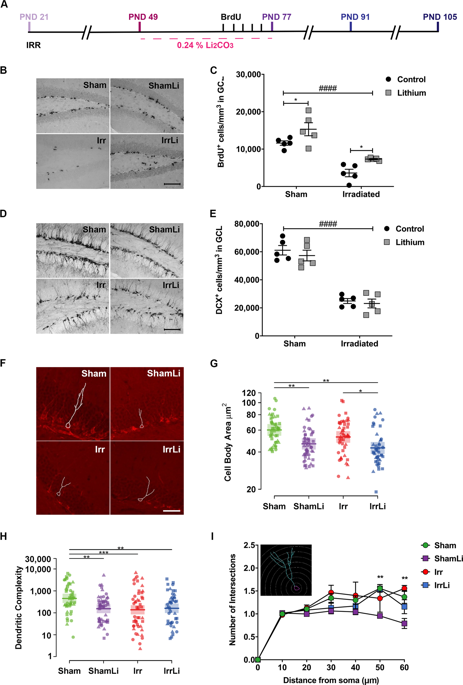Molecular Psychiatry ( IF 11.0 ) Pub Date : 2019-11-14 , DOI: 10.1038/s41380-019-0584-0 Giulia Zanni , Shinobu Goto , Adamantia F. Fragopoulou , Giulia Gaudenzi , Vinogran Naidoo , Elena Di Martino , Gabriel Levy , Cecilia A. Dominguez , Olga Dethlefsen , Angel Cedazo-Minguez , Paula Merino-Serrais , Antonios Stamatakis , Ola Hermanson , Klas Blomgren

|
Cranial radiotherapy in children has detrimental effects on cognition, mood, and social competence in young cancer survivors. Treatments harnessing hippocampal neurogenesis are currently of great relevance in this context. Lithium, a well-known mood stabilizer, has both neuroprotective, pro-neurogenic as well as antitumor effects, and in the current study we introduced lithium treatment 4 weeks after irradiation. Female mice received a single 4 Gy whole-brain radiation dose on postnatal day (PND) 21 and were randomized to 0.24% Li2CO3 chow or normal chow from PND 49 to 77. Hippocampal neurogenesis was assessed on PND 77, 91, and 105. We found that lithium treatment had a pro-proliferative effect on neural progenitors, but neuronal integration occurred only after it was discontinued. Also, the treatment ameliorated deficits in spatial learning and memory retention observed in irradiated mice. Gene expression profiling and DNA methylation analysis identified two novel factors related to the observed effects, Tppp, associated with microtubule stabilization, and GAD2/65, associated with neuronal signaling. Our results show that lithium treatment reverses irradiation-induced loss of hippocampal neurogenesis and cognitive impairment even when introduced long after the injury. We propose that lithium treatment should be intermittent in order to first make neural progenitors proliferate and then, upon discontinuation, allow them to differentiate. Our findings suggest that pharmacological treatment of cognitive so-called late effects in childhood cancer survivors is possible.
中文翻译:

锂治疗逆转了辐射诱导的啮齿动物神经祖细胞的变化并恢复了认知
儿童颅内放疗对年轻癌症幸存者的认知,情绪和社交能力有不利影响。在这种情况下,目前利用海马神经发生的治疗具有重要意义。锂,一种众所周知的情绪稳定剂,具有神经保护作用,促神经原作用以及抗肿瘤作用,在本研究中,我们在照射后4周引入了锂治疗。雌性小鼠在出生后第21天(PND)接受一次4 Gy全脑辐射剂量,并随机分配至0.24%Li2CO 3正常或正常食物从PND 49到77。在PND 77、91和105上评估了海马神经发生。我们发现锂处理对神经祖细胞具有增殖作用,但神经元整合仅在停药后才发生。而且,该治疗改善了在辐照小鼠中观察到的空间学习和记忆保持的缺陷。基因表达谱分析和DNA甲基化分析确定了两个与观察到的效应有关的新因素,即与微管稳定相关的Tppp和与神经元信号相关的GAD2 / 65。我们的研究结果表明,即使在损伤后很长时间引入锂,锂治疗也可以逆转辐射引起的海马神经发生和认知障碍的丧失。我们建议锂治疗应该是间歇性的,以便首先使神经祖细胞增殖,然后在停药后使其分化。我们的发现表明,对儿童癌症幸存者进行认知所谓晚期效应的药物治疗是可能的。


























 京公网安备 11010802027423号
京公网安备 11010802027423号